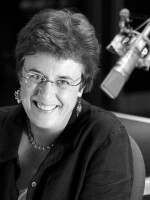LIANE HANSEN, host:
American cyclist Lance Armstrong captured a seventh straight victory in the Tour de France today. NPR's Eleanor Beardsley is in Paris on the Champs Elysees near the finish line.
Eleanor, describe what the scene was like at the finish line when Lance crossed.
ELEANOR BEARDSLEY reporting:
Well, it was crazy. I mean, you couldn't even hear anymore. The fans just went while. People were just screaming. And I mean, everyone knew he had won. As the riders kind of crossed in a pack, and actually, Vinokourov had gone out for a sprint and he actually won, so there was a lot of--'cause he pulled away, you know, at the last seconds, and so there was a lot of hysteria around that. And then the pack sort of goes over. So it happens really fast, but you just hear everyone start to roar, and the announcer's speaking really fast, so you've got to know what's happening, even though it's kind of a whirl of color in front of you.
HANSEN: Now explain how it is that Lance Armstrong won before he actually crossed the finish line.
BEARDSLEY: Well, he was actually four minutes and 40 seconds ahead of the number-two rider, Ivan Basso, as of this morning. Yesterday in the time trial, he put a minute-46, I think, between them, so he even distanced his lead even more. So everyone sort of knew today. Yesterday when he won the time trial, everyone knew he had won, barring some accident or something, you know, outrageous that would happen.
And then what sealed it even more is when the riders entered the Champs Elysees, the rain had really made the cobblestones so slick, there was already three accidents. Lance Armstrong himself narrowly missed an accident. And so they stopped the clock, actually, because they didn't want to see riders just falling all over the place. So, yes, he had won before he had actually won.
HANSEN: So the weather really was affecting the race itself; there were crashes. Did the crowd seem to mind?
BEARDSLEY: No, they didn't at all. But the crashes--it really was--there was--the pavement was very slick. The crowds didn't seem to mind; people just pulled out slickers, yellow slickers, Tour de France slickers, put up some umbrellas and just kept on cheering. So it didn't--nobody left. I mean, everyone was staying there.
HANSEN: So who was in the crowd watching the race with you?
BEARDSLEY: Well, I was in the crowd just with various people from Germany, Australia, the US, all over Europe, French people, just different people. Some people were decked out in all their team's colors. Some people had flags. You saw a lot of regional pride, like the Basque country and things like that, just regular people. But not too far from us was the presidential stand, and I did spot John Kerry up there and I saw Lance Armstrong's children and everything; this was after the race. But just a lot of regular people, cycling fans and people who live in Paris and want to come out and see the excitement.
HANSEN: Americans?
BEARDSLEY: Yes, quite a lot of Americans. I just--and now they're having a little parade. All the teams go around the Champs Elysees. You can probably hear the announcer behind me. And so the fans are still out. Everyone's watching their favorite riders go by, slowly this time. And there's a woman standing out; she's followed the tour for nine years.
HANSEN: Huh.
BEARDSLEY: She's from San Diego. She's got a big American flag. She says, `I want Lance to take it from me.' She said he took it last year, so she wants him to ride his bike with this big flag.
HANSEN: Now some of the Europeans who were watching the race, are they happy to see Armstrong retire? Because, after all, the Europeans have dominated this race for so long.
BEARDSLEY: Yes. I mean, I don't think they're happy that; there's a really joyous respect for him. His fans are exuberant, and even the people who are not his fans--maybe they have other riders they support--they all say, you know, he really is the best. If you're a cycling enthusiast, you have to respect him. And Lance got up and he took the yellow jersey with his three kids today, and the announcer was just going wild, saying, you know, `Here's Lance Armstrong, en famille, with his family, in the yellow. His children are in yellow. It's a sunny day in Paris. This is a picture that's going to go the world over.' So everyone was excited.
I think people feel that, yes, maybe there'll be some more suspense next year, 'cause he was just winning it. He was dominating so heavily. But I don't think anyone's really--there was just a big respect for him and, OK, he's retiring and that's probably good. He's going out on top. And a lot of people have said that; they've said it's great, it's a great time for him to go. So...
HANSEN: All right. NPR's Eleanor Beardsley on the Champs Elysees in Paris, where American Lance Armstrong earlier won his seventh straight victory in the Tour de France.
Eleanor, thank you very much.
BEARDSLEY: Thank you. Transcript provided by NPR, Copyright NPR.








